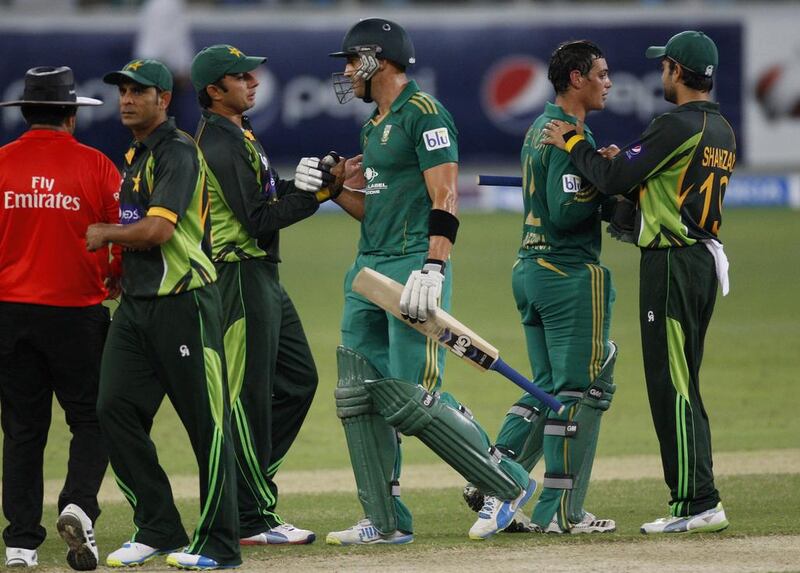“Bilateralism doesn’t brook multilateral defiances.”
So went the response of Najam Sethi, the current Pakistan Cricket Board (PCB) head, last week in Abu Dhabi.
Sitting next to him was Haroon Lorgat, the chief executive of Cricket South Africa (CSA) and the occasion, underwhelming as it was, was the signing of an agreement between the two boards to play a short, limited-overs series in South Africa, starting later this week.
The question, inadvertently as relevant to Lorgat as Sethi, was whether signing this series was an act of defiance against the Board of Control for Cricket in India (BCCI). The question was perfectly valid even if not particularly nuanced, influenced no doubt by the headlines of the dispute between CSA and the BCCI, and in the bigger picture, by the semi-permanent freeze in ties between the BCCI and the PCB.
Sethi’s response (though still not cleansed entirely of the suspicion that it is highfalutin nothingness) is worth noting, because as hurried and pointless as this series looks, it carries greater currents within it.
South Africa needed to fill however much of the vast gap left by India’s shortened tour; Pakistan always need to play more cricket. Pakistan will not fill the financial void India left behind in South Africa’s coffers. A short, limited-overs series in South Africa will not exactly replenish, as Sethi himself admitted, the PCB’s finances though any little bit will help.
“We don’t get to make too much money,” Sethi said, “but we don’t lose any and our boys get to play South Africa in South Africa.”
It is in the bigger realpolitik jigsaw of cricket, however, that the series may bring value.
Alliances in international cricket are no longer as easy to form or define as they once were. There is no geographical power bloc; there is no longer a colonialist order.
Everyone wants to be on the right side of the money, which means being on the right side of the BCCI. That means being able to generate money for them. No longer is it enough to be on good terms with BCCI; only if it makes enough money for the BCCI is the series deemed amenable.
There remains enough lucre in the Australia rivalry, for instance, despite the falling status of that side. England may well become the new vogue but between them the three hog much of the calendar. If political ties improve then, who knows, Pakistan may make it.
So trying to form an alliance outside the sphere of the BCCI makes unarguable sense, as much because both sides are uniquely-placed in this new order. Administratively, Pakistan are a joke and a mess, but not exactly a financial lightweight. The team, despite a continuing eccentricity, is still to be taken as one of the game’s stronger sides.
Because of their history, meanwhile, South Africa are a singular case, difficult to place among established geographical or cultural lines. Back in the mid-90s, when the subcontinent was emerging as a force, there was a distinct possibility that cricket would split along Asian and non-Asian lines in its governance. Tellingly at the time South Africa was happy to side with Asia.
Now it cannot be so simple, especially as they also have the world’s best Test side, which ordinarily, should make them a prize attraction for any other board. They are also still invested in the Champions League but the fallout from the spat with the BCCI means that is under threat now.
On the wrong side of the BCCI – as the PCB is too – and suddenly everything has changed. Right now, any support for Lorgat and CSA is a boon and Sethi’s words held precisely the broader message that was intended.
“It is a tight time frame,” he said, explaining why the series was agreed upon, “but it was a time for us to stand with CSA.” A time, in other words, to reach out for an ally, for an enemy of your enemy, to forge a friendship.
Not that Sethi or Lorgat, entangled within their own complications, are likely to be aware, but it represents a natural step for both boards. It is almost a consequence of history: well before their readmission, in the ’70s, the Pakistan board was among the strongest opponents of Apartheid and persistently prevented South Africa from being readmitted under Apartheid rule.
Though not particularly celebrated, or even remarkable, Pakistan and modern South Africa have actually maintained good, solid and tension-free ties over the years.
South Africa are one of the few sides Pakistan have maintained a regular schedule with (though 14 ODIs this year is a bit much) through a difficult, violence-scarred decade.
Since the start of 2000, they have played more international matches against only Sri Lanka (88 as opposed to 71 against South Africa). It is also difficult to imagine any other side – Asian or otherwise – staying on in Pakistan after a major terrorist bombing and playing out their commitments, as South Africa did in October 2007.
Not least of the benefits may be advice from Pakistan on how to cope with life without India. The PCB, after all, has now managed to survive over six years without playing India in a full series.
It is, the CSA might care to know, possible to do so.
osamiuddin@thenational.ae





